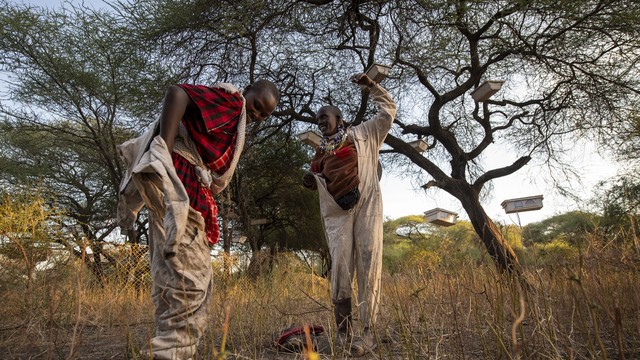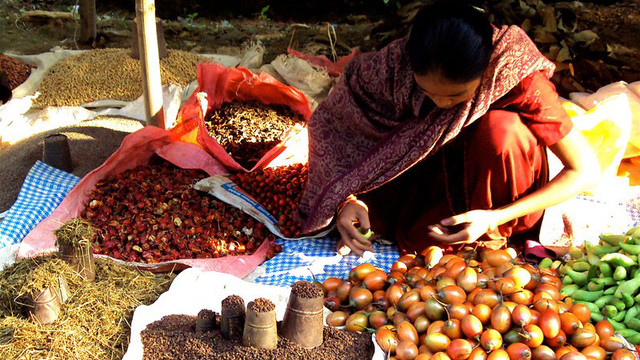Food, ecosystems, equality – can we have it all?
Sustainable landscapes are essential for our future. A major international gathering will this week look at how to speed up action for more resilient, equitable, productive and climate-friendly landscapes. IIED and partners have recently launched a new project that will use innovative ways of working to promote these outcomes in Africa.


Maize cultivation along the Kafue river in Kitwe, Zambia. Water levels in the river have decreased because of deforestation in the river’s catchment area (Photo: Barbara Adolph/IIED)
This week, the Global Landscapes Forum in Bonn will bring together experts and stakeholders to discuss how sustainable land use can be mainstreamed for the benefits of people and the planet.
Key questions will include: how can we achieve food security while retaining key ecosystem functions and services? And, can we do this while safeguarding or even strengthening the rights and wellbeing of marginalised groups?
A new partnership to address a global challenge
A new project launched by IIED and partners this month will address these same questions. The SENTINEL project will use innovative ways of working to address the challenge of producing enough food for Africa's growing and increasingly urbanised population, while conserving vital ecosystem functions and reducing inequalities. Here, we feature some of the project partners who were interviewed during the inception workshop in London, talking about the challenges the project aims to address, its ways of working and expected impact.
IIED senior researcher Phil Franks describes the challenge: "Africa is unique in having a much faster growing demand for agricultural products, in particularly food for domestic consumption. By 2050 we expect food demand to increase by two and a half times, maybe three times of what it is now.
"Historically, that is just the continuation of a trend that we've seen over many years. And to achieve that increase in production has come partly through increases in crop yields, but as much if not more from expanding area. And expanding area is the number one cause of deforestation in Africa."
Future agricultural development needs to carefully consider how ambitious food security goals of African government can be met – while minimising the negative impacts of agricultural intensification and expansion.
This requires a better understanding of the winners and losers – both in terms of 'people' and 'planet' of different development pathways. Otherwise there is a risk that agricultural development could further increase existing inequalities or create new ones – for example, if local people lose control over productive resources.
About SENTINEL
Bringing together 10 partner organisations from Africa and the UK, SENTINEL will undertake interdisciplinary research to inform policies, investments and practices. The project aims to ensure a better understanding by decision-makers in government, civil society and the private sector of the potential risks, impacts and trade-offs of alternative agricultural development pathways.
Funded by the UK research council's GCRF (Global Challenges Research Fund) GROW programme, SENTINEL has an ambitious programme that pools the expertise of leading UK and African universities – but also recognises that they need to improve the way they approach complex, intractable challenges.
But working across disciplinary boundaries to tackle complex global challenges is not new. So what is different about this initiative?
Using scenarios to break down silos
When developing the SENTINEL proposal, partners realised that both UK and African academic institutions need to improve their capacity to work in a truly interdisciplinary way to tackle complex problems straddling different sectors and worldviews. Partners also want to improve their ability to engage constructively with research users.
SENTINEL will use a process of participatory scenario development to create and use a safe space, where different stakeholders can discuss alternative futures outside their organisational silos and disciplinary mindsets.
Dr Monika Zurek, senior researcher at the Environmental Change Institute at the University of Oxford, says what is exciting about SENTINEL is that it brings different types of people together that normally don't talk in a constructive manner, in the hope of devising new ideas.
"On the one side it brings different types of researchers together… really trying to experiment with different ways of how we talk to each other and how we come up with ideas and research that are meaningful to policymakers," she says.
"It's trying to bring policy and decision-makers and researchers together through different parts of the project methodology to really get a different dialogue going across policymakers, but also across researchers and policymakers on thinking deeply, in a safe space, around some of these important challenges that are coming up for the African countries that we are working with, and how they could deal with it."
SENTINEL's aim is for line ministries in governments, private sector actors and civil society organisations to take more account of the impacts, risks and trade-offs in social, economic and environmental dimensions of different agricultural development pathways.
Dr Dora Neina, lecturer at the Department of Soil Science, University of Ghana, says: "Whatever policies we formulate to increase food production or even to contribute to economic development of the country, we should bear in mind that we have effects on other sectors of our environment. So that when we are taking decisions, they should be responsible decisions."
Developing capacities
SENTINEL will help all partners to develop new skills, learn new methods and try out new ways of working together. Partners will build the capacities of individual researchers and their organisations in ways that emphasise interdisciplinary work and engaging with research users.
This process may include challenging some of the existing research quality criteria and incentive systems for researchers in both Africa and the UK. Working together as equal partners will also lay a strong foundation for a partnership beyond the duration of the project.
Dr Moses Osiru is the deputy executive director of RUFORUM (the Regional Universities Forum for Capacity Building in Agriculture), a network of 85 universities from 35 African countries. He says: "We hope that through this project we are going to build new partnerships and collaborations with UK institutions. Secondly, we hope that staff capacity within some of these universities will benefit from these partnerships by helping to build these capacities within the African universities."
Just like the Global Landscapes Forum, SENTINEL aims to break down silos. We look forward to hearing from others who work on similar challenges and who would like to share their learning with us.
Barbara Adolph (barbara.adolph@iied.org), is principal researcher in IIED's Natural Resources research group




